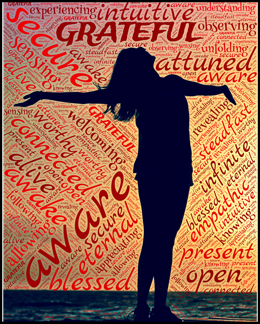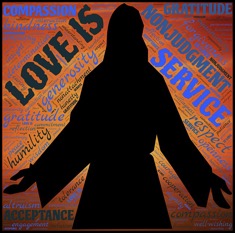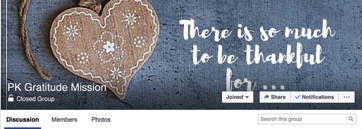Gluten-Free Gratitude
I cross paths with many members in the gluten-free community who are troubled, angry, and hurting [both emotionally and physically]. These interactions leave me with a heavy heart. Just maybe, the information found here might help ease the pain - just a little bit.
Stay strong. Keep moving forward.
Peace and blessings,
Alan Klapperch
GIG of ECW Branch Manager
A special thank you to Pastor Kimberly Stowell [my spiritual leader] for "planting the seed". This article was inspired by a recent sermon.
"This being human is a guest house.
Every morning a new arrival.
A joy, a depression, a meanness,
some momentary awareness comes
as an unexpected visitor.
Welcome and entertain them all!
Even if they're a crowd of sorrows,
who violently sweep your house
empty of its furniture,
still, treat each guest honorably,
He may be clearing you out
for some new delight.
The dark thought, the shame,
the malice, meet them at the door laughing, and invite them in.
Be grateful for whoever comes,
because each has been sent
as a guide from beyond."
Jalal Al-Din Rumi
Translation by Coleman Barks
Rumi's "The Guest House" poem reminds us to welcome all of our life experiences, even those we consider less desirable.
The emotions we encounter in this life offer us the ability to enter a new state of being - to learn something new about ourselves. Perhaps, they may be preparing us for greater things to come.
No one decides one day to play host to a gluten-related disorder. I know I didn't. This "unexpected visitor" appeared - liked the new digs and decided to hang around. In my heart of hearts, the path that I have traveled is not one I would have chosen. I am eternally thankful for what nutritionist and author, Melissa Diane Smith calls “the gift of gluten-free.” All those years ago, when I was lying on the living room floor in the fetal position, I could not have imagined what was in store for me [besides death].
I had to give up gluten, but what I have received in return is beyond measure.
It took a while to realize it, but I was given an opportunity to use my skills and talents to help others. I discovered talents I didn't know I had! The biggest gem unearthed in me was a passion and a purpose - something that was lacking in my life previously.
I consider myself an ordinary, average guy. If this transformation can happen to me, it can happen for you.
It doesn’t take long to realize that going gluten-free changes our life - forever.
This new reality hits us with the force of a speeding freight train. In some cases, it comes out of nowhere. No lights, no whistles, no warning what so ever. WHAM! Our life shatters into a million pieces.

With increased rates of anxiety and depression, it’s no wonder those with gluten-related disorders consider ourselves to have a lower quality of life than our peers. As we might expect, grief soon appears. We need to allow ourselves to process those feelings. It’s easy to understand how we could get caught up in a never-ending downward spiral of negativity and despair. There are days we feel as if there is no way out.
I’ve painted a rather dark and brooding [albeit realistic] picture of what it's like to live with a gluten-related disorder. For some, it's all of this and more. For others, they adapt and adjust with minimal or no hardship. We would see similar pictures if we explored other chronic health conditions or tragic life circumstances..
We can’t help but wonder, will we ever feel better about our situation? Is there a way break out of these emotional and physical shackles? YES!
GRATITUDE A Professor of psychology at University of California, Davis and director of Emmons Lab. His focus is on the science of gratitude and its effects on health and wellbeing. 
“Gratitude heals, energizes, and transforms lives. We are engaged in a long-term research project designed to create and disseminate a large body of novel scientific data on the nature of gratitude, its causes, and its potential consequences for human health and well-being. Scientists are latecomers to the concept of gratitude. Religions and philosophies have long embraced gratitude as an indispensable manifestation of virtue, and an integral component of health, wholeness, and well-being.”
Author of several books including: “Thanks!: How Practicing Gratitude Can Make you Happier” and “Gratitude Works!: A 21-Day Program for Creating Emotional Prosperity”
What is gratitude?
Dr. Emmons defines gratitude as:
He maintains that gratitude consists of two key components: affirmation of goodness, and knowing where it originates. He writes:

I think it's safe to say that every gluten-free person has ridden an emotional roller coaster. People suffer for years [6 – 10 years on average]; endure numerous doctor's office visits and usually walk away with more questions than answers. Frustrating, to say the least. The result of finally getting answers to the on-going health issues brings an immediate sigh of relief, almost a giddiness. “WHEW, I finally know what's wrong with me!”
All too quickly that euphoria dissipates when reality comes calling - “What am I going eat and how am I going to handle this?” Convenience – gone. Care-free dining – adios. The joy of family gatherings - replaced with dread and worry. Things that took little or no thought - now rivals the logistics of a Mars Rover launch.
For many of us, this transition can be a difficult time.
By Robert Emmons, PH.D.
A decade’s worth of research on gratitude has shown me that when life is going well, gratitude allows us to celebrate and magnify the goodness. But what about when life goes badly? In the midst of the economic maelstrom that has gripped our country, I have often been asked if people can—or even should—feel grateful under such dire circumstances.”
Read More: http://bit.ly/2feicp2
At first glance, the gluten-free lifestyle means giving up a lot of things. However, as we start picking up the pieces of our life and clearing away the debris, we discover that goodness is still there. It has not abandoned us; it is merely manifesting itself in different ways - ways that are unfamiliar to us. Somedays, we may need to dig damn hard and deep to find the goodness.
Gratitude allows us to focus on what we have instead of what was taken away.
Let’s explore a few of these gluten-free gifts. Probably the most obvious and precious gift is the opportunity to improve our health. The gift of love from someone who cares for us when we don’t feel well. The gift of compassion from our best friend or loved one who is learning right alongside us - cheering us on - being our gluten-free champion. The gift of kindness from a stranger in the gluten-free aisle at the grocery store as they help us avoid a nuclear meltdown because we don’t know which product to get. The gift of friendship as we meet others in the gluten-free community; we realize we are not isolated, nor alone. The gift of comfort when we find a product that is labeled and certified gluten-free. These examples scratch the surface.
For over a decade, Dr. Emmons and his associates have scientifically documented the social, physical, and psychological benefits of gratitude.
- Gratitude increases happiness.
- Gratitude reduces anxiety and depression.
- Gratitude blocks negative emotions.
- Gratitude improves health: strengthens the immune system, reduces blood pressure, lessens symptoms of illness, decreases awareness of aches and pains.
- Gratitude improves sleep. Better sleep is an important factor in improving overall health.
- Gratitude promotes forgivness.
- Gratitude fosters a “pay it forward” attitude.
- Gratitude strengthens relationships.
The Power of Gratitude: http://bit.ly/2ejTxQr
What Good is Gratitude? http://bit.ly/2feq4a6
The Benefits of Gratitude: http://bit.ly/2fAOX0e
Gratitude sounds great, but how can we best harvest these transformative powers?
Cultivating an attitude of gratitude takes a bit of work and practice. At first, you may feel uncomfortable or awkward doing it. You may be wobbly and unsteady, just like taking your first steps or your first attempt at riding a bike. You might even find it emotionally painful - you know - kind of like those muscles you didn’t know you had until after raking the lawn. Like any skill or activity, the more we do it, the better we get. It is best to start slow and work your way up.
Dr. Emmons suggests these exercises to get started. Please be sure to click the links for a more detailed description of these exercises and the reasons why they work:
- Count your Blessings: Regularly make mental notes of your blessings - no need to write them down. Do it first thing in the morning or before going to sleep. Ask yourself, “What am I grateful for today?”z
- Three Good Things: For a minimum of one week, write down three things that went well each day. Small or large events - it doesn’t matter. A tangible, written paper trail is essential. In detail, explain why things went well. Capture how you felt at the time and how you felt when remembering the event. Share your thoughts about what caused the event. If you happen to focus on negative feelings - shift focus toward the good events and those positive feelings.
- Gratitude Letter: Write a letter to someone who did something for which you are grateful, but you’ve not fully shared your gratitude. It’s best if this person is still alive - someone you can meet face-to-face. When you meet, read them the letter. Take note of their reaction as well as your reaction. Together, discuss your feelings about the letter.
- Savoring Walk: For a minimum of one week, go for a 20-minute walk. Take a different route each day. During this time, notice as many positive things as you can - sights, sounds, smells, and touches. As you notice something, pause a moment and understand why it’s pleasurable to you.
- Keep a Gratitude Journal: This is similar to Three Good Things above but more in-depth. Evidence shows journalling one to three times per week elevates happiness better than daily writing. For a minimum of two weeks - at least once a week for 15 minutes, describe up to five things for which you feel grateful.
By Robert Emmons, PH.D.
Read More:
Some people find they do better when surrounded by others - like having a workout partner(s). Participating with another person or a group of people inspires and motivates them to continue.
We know the power behind the act of expressing our own gratitude - participating with a group of people expressing their gratitude has to multiply that power - right?
If you are on Facebook and interested in participating in such a group, I invite you to check out PK Gratitude Mission.
This is a closed group, created by Pastor Kimberly Stowell - my pastor and spiritual leader of St. Stephen's Lutheran Church, Rogersville, Wisconsin (home of the gluten-free communion). Only members of the group can participate and see the posts to the group, so you’ll need to request to join or be invited.
When asked about the purpose of the group, Pastor Kimberly says: “The Gratitude Mission is about helping and upifting others.”
If large groups frighten you, fear not. Currently this group is small; consisting of less than 80 people. Everyone is kind, courteous, and respectful. I am a member; I find witnessing other people’s gratitude moving and inspirational.
~oOo~
Thank you for your time. I will leave you with one final message of inspiration…
“When life gets you down, you know what you gotta do?
Just keep swimming,
Just keep swimming,
Just keep swimming swimming swimming,
What do we do we swim swim swim”
~Dory
Finding Nemo
Alan Klapperich
GIG of ECW Branch Manager
